

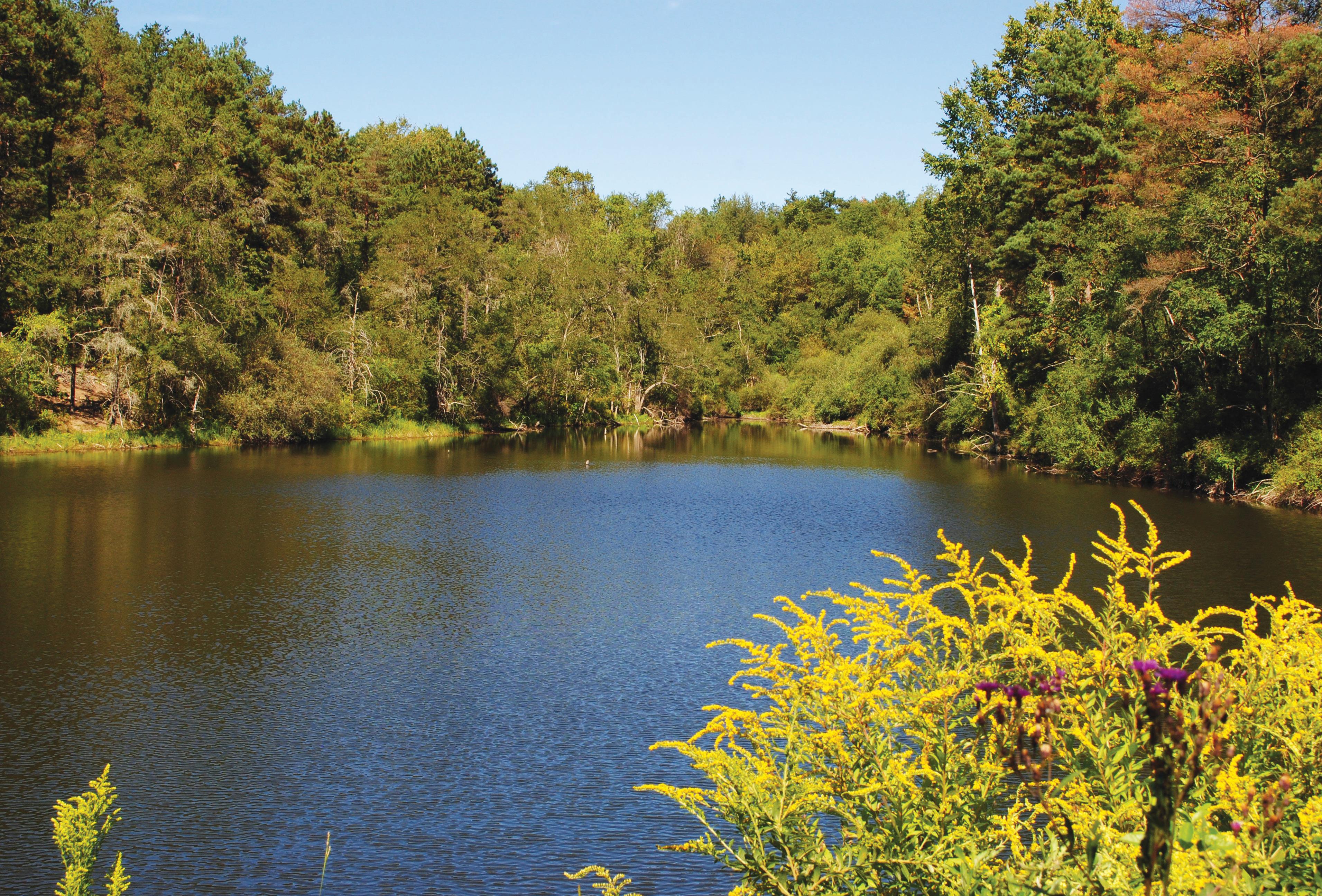




















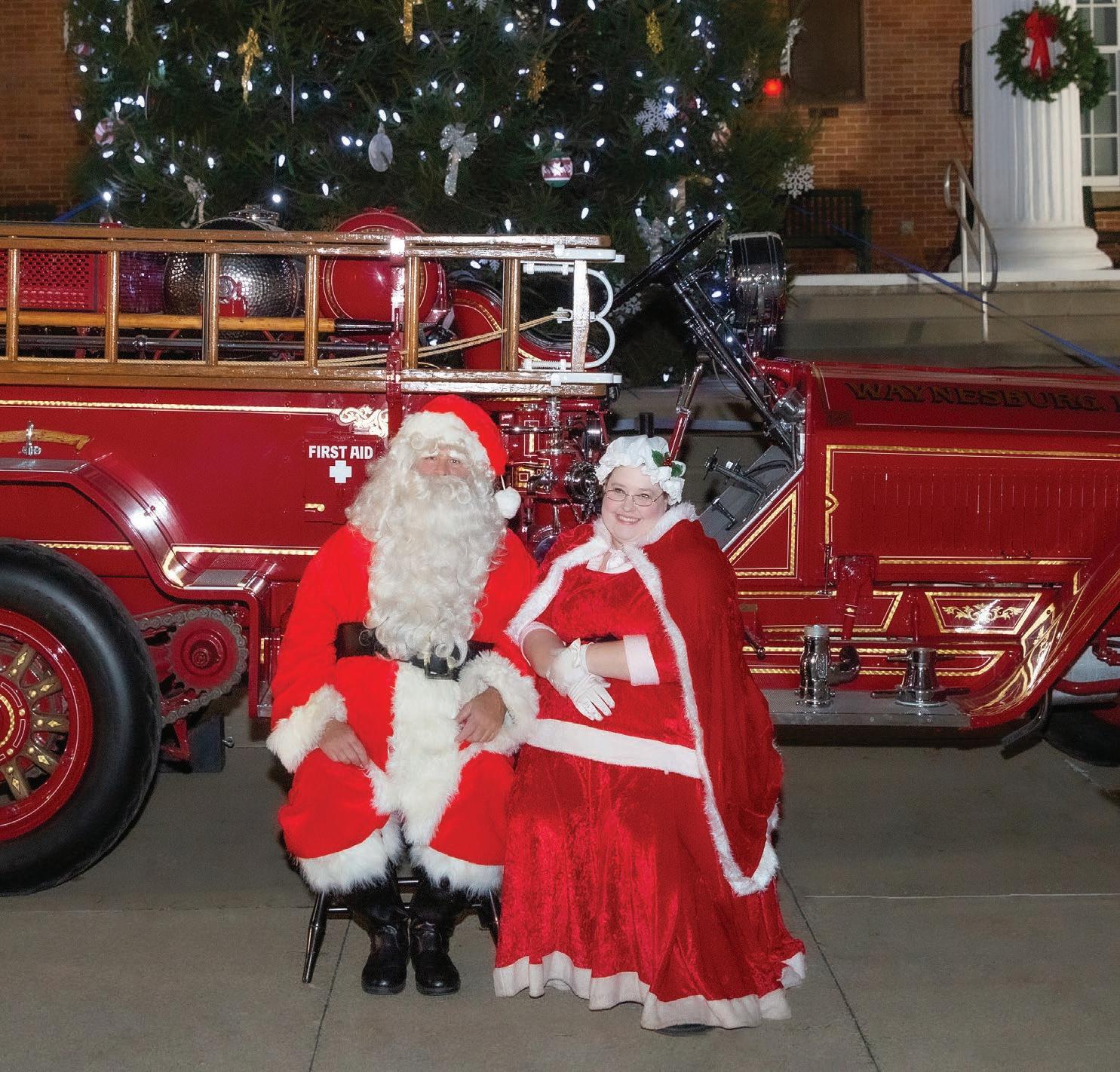































Before there was steel, there was iron. And before the massive mills of Pittsburgh sent steel around the world, Fayette County made the iron that made the steel industry possible.
It’s not truly accurate, though, to say Fayette “made” iron. Iron occurs naturally as one of the most abundant elements in the earth’s crust. However, to render iron useful, it had to be mined, heated and chemically reduced to extract metallic iron from raw ore. As the Industrial Revolution took hold in early America, entrepreneurs built scattered, small-scale furnaces for that purpose, yielding iron ingots that could then be fashioned into plows, tools and all the metal needs of a new nation.
According to “The Pioneer Iron Industry in Western Pennsylvania” by George W. Hughes, iron smelting in Pennsylvania started around Reading, Berks County in 1716. Hughes states that the first iron furnaces west of the Allegheny Mountains were built in Fayette County around 1790 along Jacobs Creek near present-day Everson and at Fairchance.
Later, through the first half of the 19th century until shortly after the Civil War, iron furnaces sprang up all around Fayette County, which became the center of the iron industry west of the mountains.
Hughes’s narrative cites furnaces pouring out molten iron at Fayette County communities in “Springhill,” Redstone Township, Smithfield and near Uniontown. Several early furnaces were clustered around Dunbar, including the Union Furnace and Center Furnace, the latter still visible as a jumble of cut stone deep in the remotest part of the mountains above Dunbar. The historic Thomas Meason house atop the hill east of Laurel Mall was home to one of Fayette’s iron tycoons.
Natural resources were the key to Fayette’s iron boom. The county had plentiful iron ore deposits, and extensive forests provided the charcoal needed to heat the furnaces and as the reducing agent to remove impurities from the ore. Iron production here consumed one acre of forest per day, per furnace. At the height of the iron boom in the 1850s, two dozen furnaces operated in the county, requiring 25 acres of woodland daily to be cut and baked into charcoal.
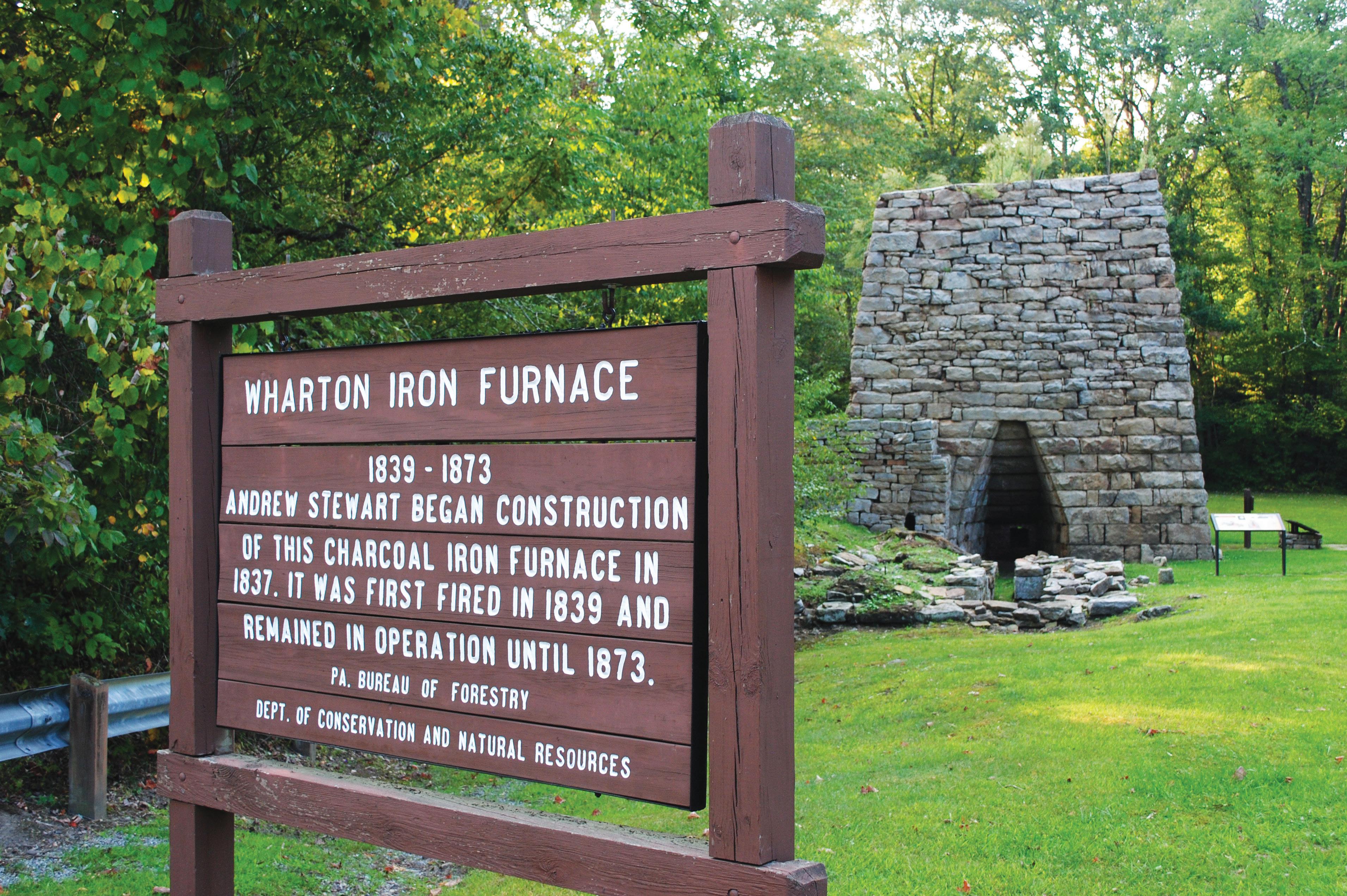
Except for the names of some communities like Lemont Furnace and Oliphant Furnace, we have few reminders of Fayette’s bustling iron industry of the 1800s.
But there is one relic of that time where visitors can still sense the energy and importance of early iron. The Wharton Furnace stands refurbished on its original site in our mountain area between Chalk Hill and Elliotsville.
Andrew Stewart, a prominent Fayette County attorney, entrepreneur and statesman, began building Wharton Furnace in 1837. The furnace fired its first charge of iron in 1839 and continued production until 1873. Wharton was one of the largest furnaces in the region. Its iron was cast into cannonballs for the Union Army in the Civil War and horseshoes for military and civilian use.
Visitors to Wharton Furnace today see a large pyramid of stone, like an immense beehive. That stone was the heart of the furnace where the iron was heated and reduced. But in operation, an
elaborate wooden infrastructure supported the furnace, including a wooden tramway above for hauling in wood and charcoal, and a waterwheel assembly that supplied mechanical power. Wharton Furnace’s sluiceway diverted nearby Chaney Run to turn the wheel. The sluice remains well preserved on the site but no longer carries water.
By the 1870s, technological advances made iron production at Wharton unprofitable. Forests were nearly exhausted, and coke proved a better, cheaper fuel than charcoal in the rising steel industry. Also, it was expensive to ship heavy products like iron long distances, and Wharton Furnace was far from any railroad. Fayette County’s iron commerce declined as the steel industry in Pittsburgh blossomed. Steel, which is iron blended with carbon in a more complex industrial operation, is stronger and more flexible than iron. Steel became the preferred metal.
The restored Wharton Furnace stands on land now part of the Forbes State Forest, administered by the Pennsylvania Department of Conservation and Natural Resources Bureau of Forestry. The Forestry Bureau restored the furnace cone in 1962 after the Wharton Furnace stands on land of the Forbes State Forest, with more than 50,000 acres of public forest stretching across Fayette, Somerset and Westmoreland counties. The Bureau of Forestry maintains the site.
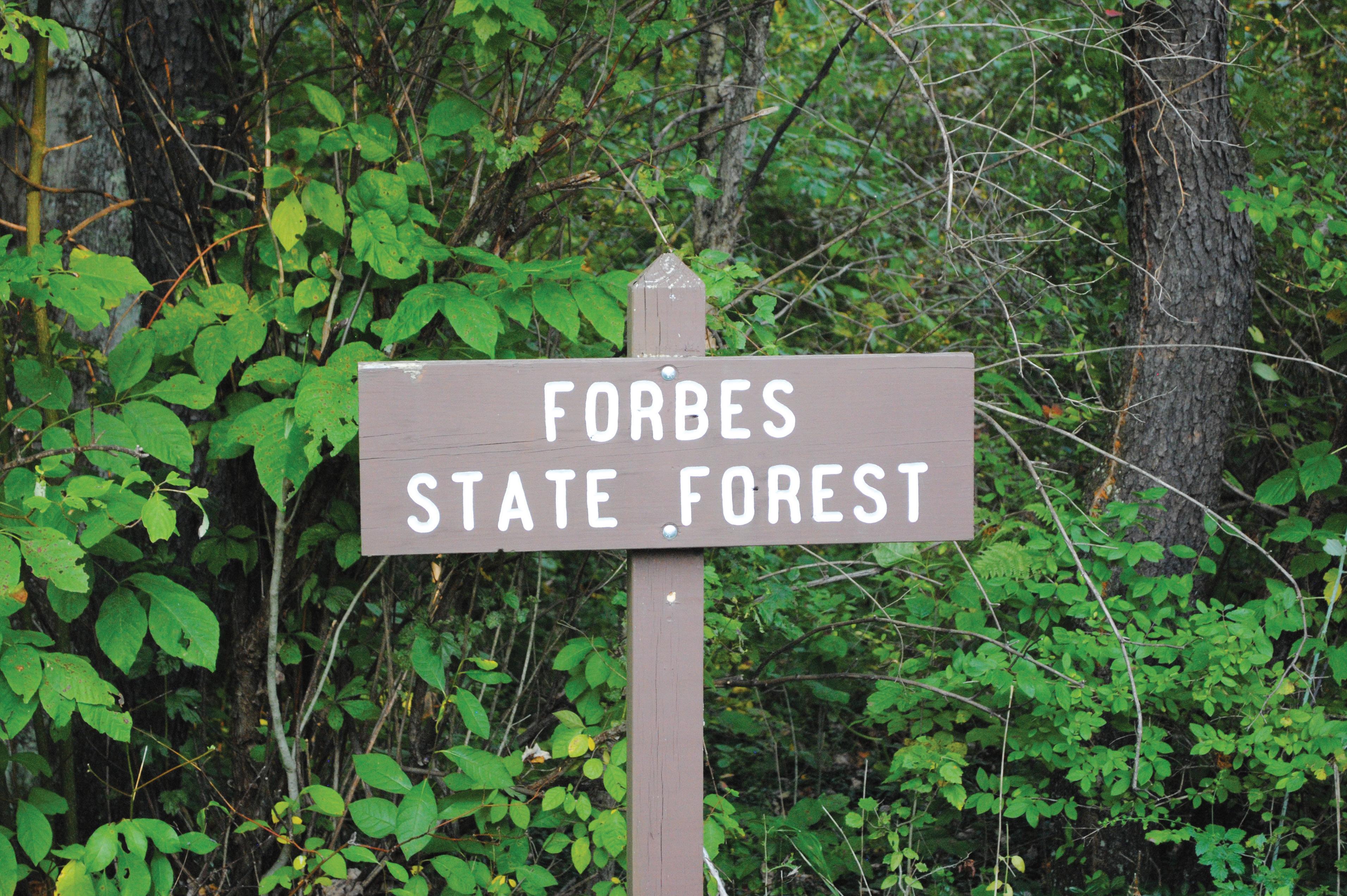
Fort Necessity Lions Club and the Historical Society of Western Pennsylvania began an initial fundraising campaign to improve the grounds. Forestry completed further upgrades to stabilize the furnace’s stone and installed interpretive signage in 2016. In 1991, the U.S. Department of Interior recognized Wharton Furnace in its National Register of Historic Places.
Visitors today find a well-maintained furnace relic, level gravel pathways and neatly mowed grounds. Attractive signs tell the story and reveal Fayette County’s key position in the Industrial Revolution. Visitors are just a short drive from other outstanding attractions in the Laurel Highlands. Nearby are Fort Necessity National Battlefield, Ohiopyle State Park, Fallingwater, Kentuck Knob, Bear Run Nature Reserve and the Great Allegheny Passage.
To find Wharton Furnace from any starting point in “the lowlands” surrounding Uniontown, take Route 40 (The National Road) east over Summit Mountain. As you descend the Summit on its eastern face, turn right (south) on Wharton Furnace Road (State Route 2003) about halfway down the mountain.
Follow Wharton Furnace Road south for two miles to the intersection with Sheperd Road and Fayette Springs Road. The Furnace will be on your right at the intersection. Parking is along Sheperd Road.
Approaching from Confluence, Markleysburg or points east, go west on Route 40 to the village of Chalk Hill. There, turn left (south) on Fayette Springs Road. Continue on Fayette Springs for two miles to the intersection of Wharton Furnace Road and Sheperd Road. You’ll see the furnace ahead.
Explaining why the DCNR Bureau of Forestry, charged with forest management and conservation, took an interest in visitors’ experience at an old industrial site, DCNR’s Forbes Forest District manager Ed Callahan said, “Wharton Iron Furnace is an important monument to our nation’s early industrialization. The furnace used natural resources, including vast quantities of the surrounding forest (for charcoal) to produce iron for the Industrial Revolution. Because Wharton Furnace is located on our state forest lands, we protect it and maintain it so people can learn about the past, which helped shape the way things are today.”

THANK YOU for Voting Us


PreSchool, ages 3-5 Keystone Stars Level 4
Voted Best of the Best in 2023
Kindergarten PA Dept. Ed Approved
1st Grade PA Dept. Ed Approved
2nd Grade PA Dept. Ed Approved
Before & A er Care K through 6th
Preschool and School Age Summer Program
• Degreed & Certi ed Faculty
• Handicapped Accessible
• Accommodating Children With Special Needs
• Award Winning ABEKA Curriculum
• STEM Incorporated Learning
• Address Music & Drama
• Spanish
• Outdoor Education
• Sign Language














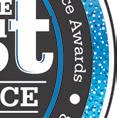





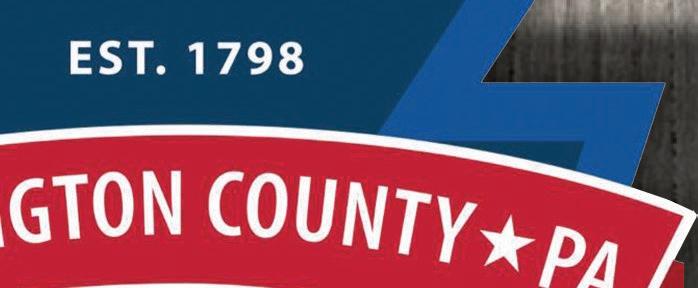










Kid Mania Kids Seasonal Consignment Event
October 4-5 • 9am-6pm, October 6 • 9am-2pm
Trunk or Treat October 13 • 5-6:30pm
PA Arts & Crafts Christmas Festival
October 18 • 10am-5pm, October 19 • 10am-6pm
October 20 • 10am-5pm, October 26 • 10am-6pm, October 27 • 10am-5pm
Pittsburgh Gem Show
November 1 • 12-8pm, November 2 • 10am-6pm November 3 • 10am-5pm



















Duncan Miller Glass Show & Sale
November 2 • 9am-4pm, November 3 • 10am-3pm All Clad Sale
December 6 • 8:30am-7pm, December 7 • 8:30am-4pm
Deck The Barns

December 12, 13 & 14 • 6pm-10pm
Visit washingtonfair.org/events for more information




** 2022




** FACILITIES FOR EVENTS OF ALL









From a meeting for 10 people to a trade show for thousands, The Washington County Fairgrounds & Expo Center has the facilities and the experience to help make your event a success. The Fairgrounds venues are situated on 156 acres and include five exhibit halls, ten barns, a show tent, show arena, a three thousand seat grandstand, and more parking than you will ever need.










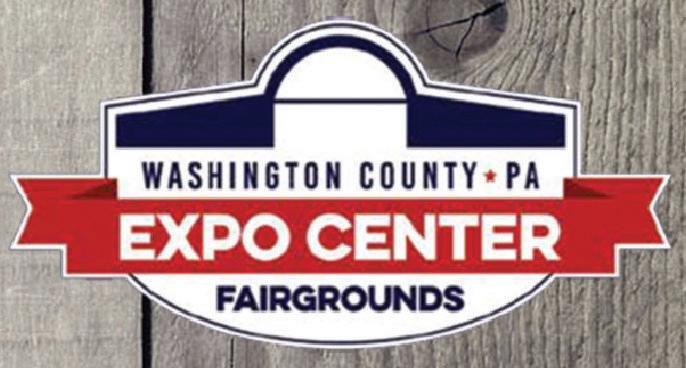














An out-of-the-way historic gem commemorates a famous dividing line, developed cooperatively by two counties in two different states
Straight lines are so commonplace on maps that we take them for granted. But, establishing an actual line on the earth’s natural surface so that line can be printed with meaning on paper is a technical challenge, even today. In the 18th century, it was daunting and even dangerous.
Striking across our region is the most famous straight line in American geography, a line of immense social and political importance. The Mason-Dixon Line marks Pennsylvania’s 200-mile southern boundary with Maryland and continues westward as the southern border between Fayette and Greene counties, Pennsylvania, and the state of West Virginia.
The compelling story of the Mason-Dixon line and the men who placed it is unveiled at the Mason Dixon Historical Park, straddling the line just south of Mt. Morris, Greene County. About half the 295-acre park lies in Greene County, and half is in Monongalia County, West Virginia. The park commemorates the technological and adventurous accomplishments of Charles Mason and Jeremiah Dixon, who, between 1763 and 1767, made the first precise geodetic survey ever completed in North America — the Mason-Dixon Line.
Mason and Dixon placed their final and most westward survey marker within what’s now the park. To preserve that history, Monongalia County and Greene County began working together to open the park in 1983 after Consolidated Gas donated the land.
Today, Mason Dixon Historical Park is a delight to visit. It offers hiking trails, rental picnic facilities, athletic fields and a wide range of camping options and rental cabins. Some of the cabins replicate the log cabin construction that pioneers in the region built at the time of the Mason-Dixon survey.
Dunkard Creek winds through the park, crossing the Mason-Dixon Line repeatedly as it flows eastward. A canoe and kayak launch ramp invites paddlers to explore the remote, winding channel and a recovering fishery.
The park’s “Red Barn” hosts a diverse array of events throughout the spring, summer and fall. The annual Ramp Dinner in April is most widely acclaimed, but a concert series featuring acts like the Hillbilly Biscuits and The Crooked Roots is popular. A fall Buckwheat Breakfast wraps up events for the year. This year’s Buckwheat Breakfast is Oct. 19 from 8 a.m. to noon.
Throughout the 1700s, the Calvert family from Maryland and the Penn clan of Pennsylvania disputed the boundary between their colonies. The families hired Mason, an expert astronomer, and surveyor Dixon, to plot the line and settle the issue. Both men were British. They progressed westward from a point southwest of Philadelphia, crossing the mile-wide Susquehanna River and all the rugged parallel ridges of the Appalachians and Alleghenies.
Mason and Dixon fixed their positions along the line by working at night, using the most advanced scientific instruments available in the mid-18th century to track the movements of stars. During the day they erected stone markers at regular intervals.

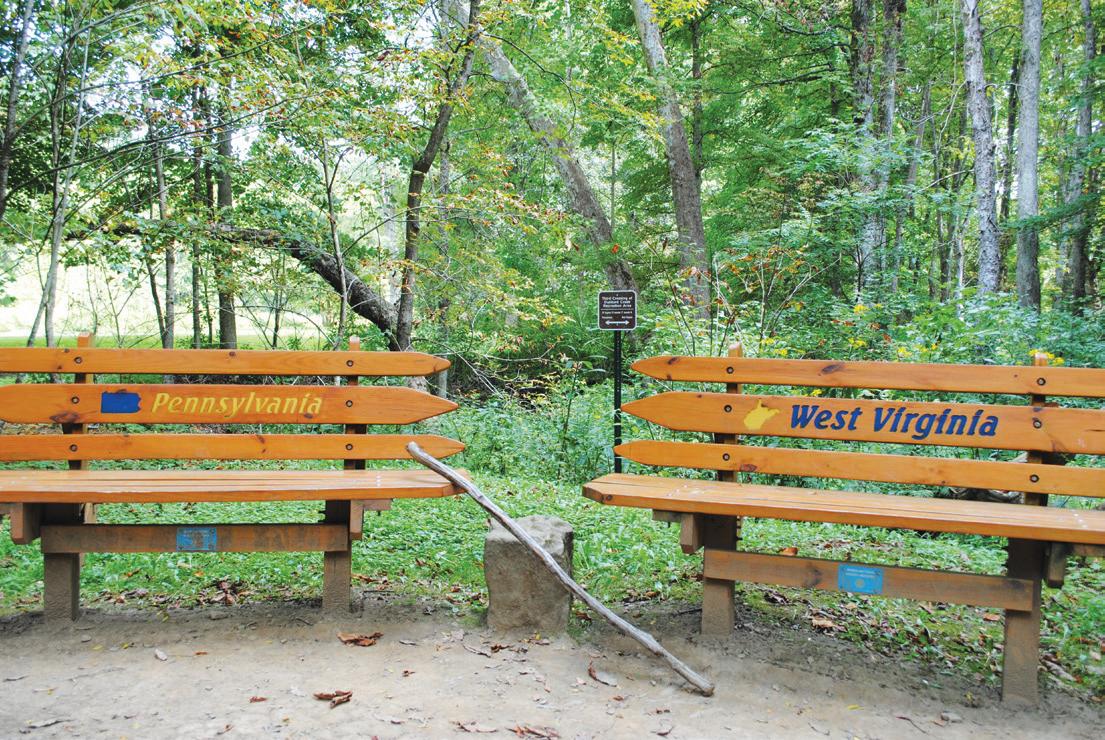
Slightly east of Mason and Dixon’s westernmost marker, another stone along the line is flanked by attractive benches — one in Pennsylvania and one in West Virginia. The writer’s hiking staff is shown at the center.
The work took nearly five years, but the team never reached what is today the line’s western end.
In early October 1767, accompanied by friendly Iroquois guides, they crossed the Monongahela River and reached Dunkard Creek at the presentday location of Mason Dixon Historical Park. There, the Iroquois told Mason and Dixon they would go no farther west because they were approaching the Catawba Warpath, which was traveled frequently by hostile tribes who did not welcome the survey’s western incursion.
Mason and Dixon had proved hardy, determined and resourceful throughout their 231-mile odyssey. But they were also prudent and respectful of the hostile tribes’ objection and did not relish the thought of working in hostile country without Native interpreters and guides. On the night of Oct. 11, they made their final calculation atop a steep ridge nearly encircled by the circuitous course of Dunkard Creek. They marked the spot with a post emblazoned with “W” on its western face, surrounded by a 5-foot-high cone of stone and earth. From there, the pair headed back eastward.
Seventeen years later, in 1784, American scientist/surveyors David Rittenhouse and Andrew Ellicot completed the line 23 miles farther west to Pennsylvania’s present-day extreme southwest corner.
Mason and Dixon never envisioned the significance their line would assume nearly a century later as the divider between free states to the north and slave states to the south. In their time, the line’s western reaches marked the border between Pennsylvania and Virginia. West Virginia did not exist until 1863 in the depth of the Civil War, when Virginia’s 55 western counties, which had opted to leave Virginia, were admitted to the Union as the separate state of West Virginia.
Visitors to Mason Dixon Historical Park can stand at the exact location of Mason and Dixon’s last marker. A footpath begins near the Red Barn and rental cabins, then climbs the face of Brown’s Hill. At the crest, the path levels toward a more recently placed marker in the exact spot. That stone is carved with a “P” on its north face and a “W” (for West Virginia) on the south side.
The walk is about one mile long, marked with red paint blazes on trees, but is extremely steep near the beginning. There is another, more moderate approach from the opposite direction. It begins at a gate near the ballfield parking area along Dunkard Creek. Follow the Green Trail from there and turn left on the red-marked trail to cross into Pennsylvania and wind around the “back” side of

The park offers camping and cabin rentals at reasonable prices. Some cabins replicate the pioneer construction of the 1760s when Charles Mason and Jeremiah Dixon surveyed the Mason-Dixon Line.
Brown’s Hill on a longer but more gradual climb. Trail maps are available at the Red Barn and at several interpretive kiosks throughout the park.
Hikers reaching the historic stone marker will cross a network of other trails along the way. The Green Trail, which flanks Dunkard Creek before looping back in return, features a puzzling surprise. Along the trail are large panels decorated with intricate mosaics that interpret planets of the solar system.
The Bluebell Trail holds the most charming surprises. To reach it, follow the Green Trail from the ballfield parking lot, cross into Greene County, Pennsylvania, then make a left turn soon after onto the Orange Trail. Within a few hundred feet, turn right onto Bluebell Trail, marked with yellow blazes. Walking on Bluebell is easy, mostly flat, and a journey into whimsical fantasy. All along the path, visitors have built tiny fairy houses out of bark, stone, roots, and other natural materials. Miniature figures of elves, fairies, trolls and cartoonish animals populate the houses. The creative imagination displayed by some of the houses is spellbinding.
It’s not clear if anyone who visits is free to



construct a house, but that’s the appearance. Visitors who wish to build a fairy house along Bluebell Trail should contact park authorities before proceeding.
It’s fair to say that Mason Dixon Historical Park is “a little off the beaten path.” To reach it from Waynesburg or Uniontown, take Interstate 79 south to Exit 1 at Mt. Morris. Exit there and head west (right) into Mt. Morris. on Locust Avenue. Cross over Route 19 and continue downhill to Wades Run Road. Turn right (west) on Wades Run, then proceed about 300 feet to the intersection with Buckeye Road. Turn left (south) on Buckeye Road and continue to the West Virginia line. After crossing into West Virginia, continue for two miles on Buckeye Road (WV Route 39) to the park entrance on your right.
The park’s address is 79 Buckeye Road, Core, WV 26541. The Red Barn, picnic pavilions, ballfield and other facilities are all located in West Virginia, but many of the park’s interesting historical and recreational features lie in Greene County. For more information, visit visitgreene.org or call 304-879-4101.




































































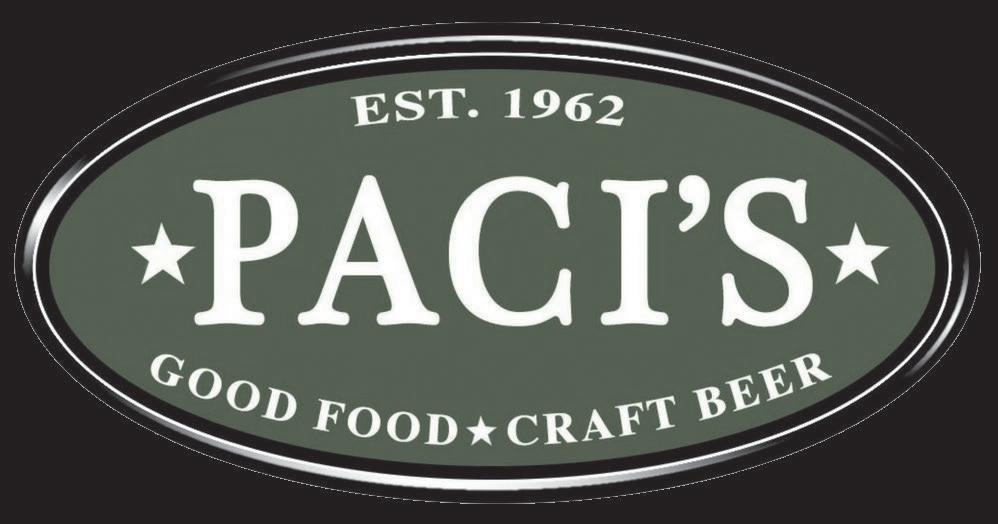











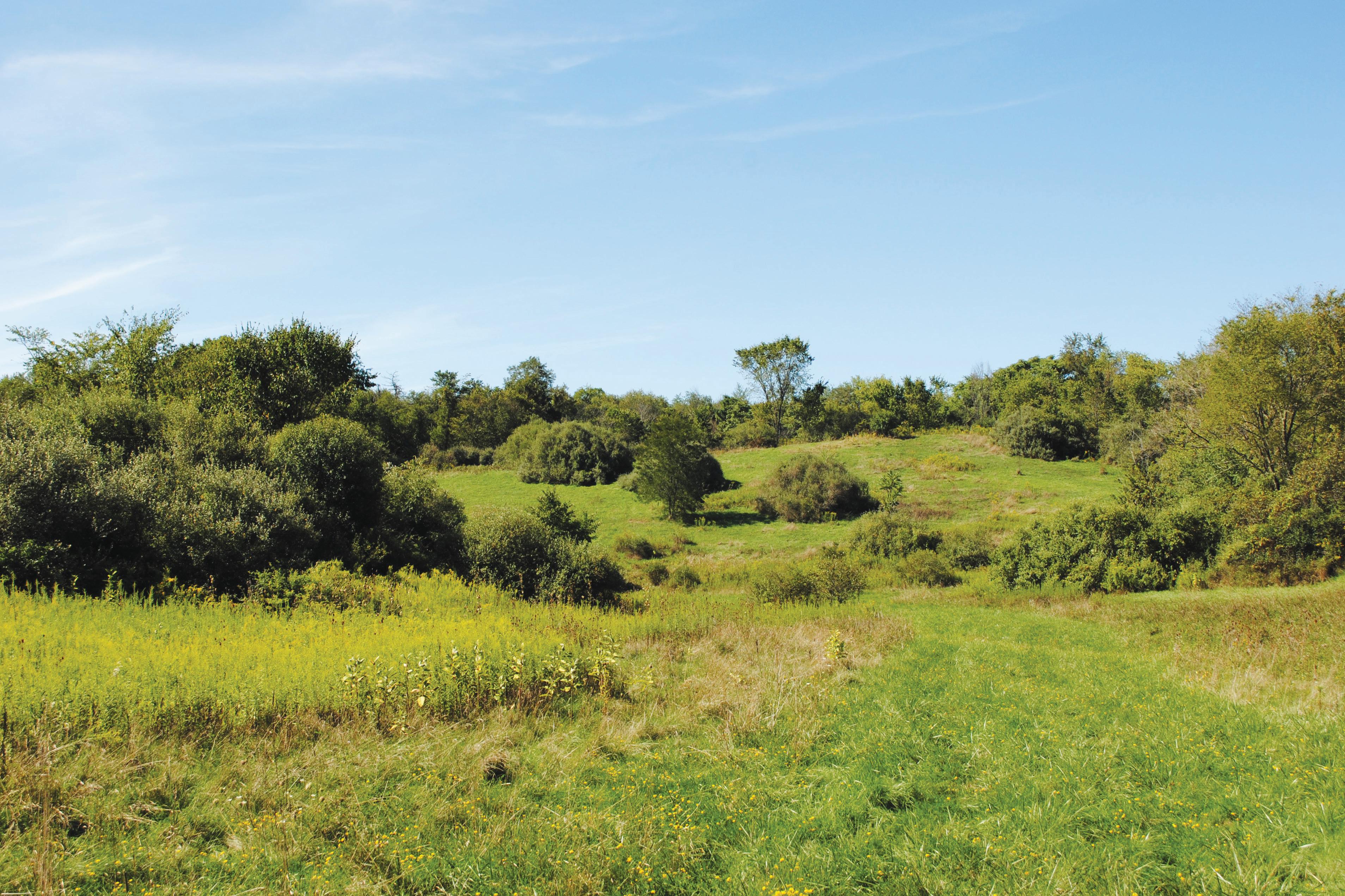
State Park’s 3,700 acres are an appealing mix of woods, meadows and old fields.

Jet passengers approaching Pittsburgh International Airport from Cincinnati, St. Louis, Houston, or Phoenix might look down during final descent and wonder, “Where are all the people?”
That query would hit them as they passed over Hillman State Park in northern Washington County, 17 miles southwest of the airport runways. The park covers 3,700 acres of undeveloped public land that everyone is welcome to explore and enjoy. It’s a surprisingly large wild expanse, so near to an American city.
“Re-wild” fits the place better. What’s now Hillman State Park was once far different from the verdant haven it is today. Through most of the 20th century, the site embraced Pennsylvania’s largest open-pit coal mine. Small-scale operators began stripping coal there as early as 1914. The much larger Harmon Creek Coal Corporation acquired thousands of acres in 1932 and, by 1968, had extracted 15 million tons of bituminous coal from its hollows and hills.
What’s now a public park might have become a desolate wasteland, as did so much of coal country. But Harmon Creek Coal and its president, James F. Hillman, considered land reclamation an integral part of the mining process. They began regrading and replacing topsoil in 1937, long before the first mine reclamation laws were passed.
Harmon Creek Coal operated its own tree nursery and planted 30,000 pine, oak and ash seedlings on
the slopes. Elsewhere on the tract, they nurtured plots of corn, sorghum and sunflower for wildlife and stocked fish in lakes converted from old mine pits.
In 1969, Harmon Creek donated nearly 3,700 acres of largely restored land to the Commonwealth of Pennsylvania for public outdoor recreation. At that time, Harmon Creek’s gesture was the largest single land donation to a state conservation agency in the nation’s history.
The state refined reclamation during the 1970s and designated the tract as Hillman State Park, honoring Harmon Creek president James F. Hillman.
Visitors to Hillman State Park should adjust their expectations before arrival. Don’t expect the crowds encountered at Ohiopyle, Laurel Hill or other popular state parks. Don’t even expect a picnic table or a park bench. Hillman is different.
Perhaps because of some challenges that remained in reclaiming the site, the Pennsylvania Department of Conservation and Natural Resources, which administers state parks, decided to manage it differently while still providing outdoor recreation. DCNR leases the entire 3,700 acres to the Pennsylvania Game Commission, which operates the tract as a state game land and identifies it as “Special Area 432.” The Game Commission manages these lands primarily as wildlife habitat
and for public hunting. So, visitor amenities are less apparent than in typical state parks. Hillman State Park exists today as a sizeable wilding tract with robust populations of deer, wild turkey, rabbits and songbirds but few visitor facilities.
But Hillman does feature an extensive network of hiking trails that penetrate diverse habitats. Just like all state game lands, the public is welcome there. Anyone is free to hike, study nature, fish, photograph, cross-country ski, ride horseback or ride mountain bikes to explore this historic monument to land reclamation. As with all game lands, no motorized travel by ATV or motorbike is permitted beyond appropriately marked roads.
Hillman State Park is a place that beckons the adventurous. If you don’t need a lot of “frills” outdoors but do enjoy exploring intriguing places where you might encounter beavers, a bobcat, or even a bald eagle soaring over a remote lake, Hillman deserves a visit.
If you hadn’t read about Hillman’s history, you might not have sensed it had once been a coal mine. It’s an expanse of wooded hills meshed with open meadows and brushy fields. Dense stands of pine planted on the ridges back in the 1960s, now towering, give the place a “Western” feel. Most surprising are the lakes. Hikers encounter beautiful watery jewels scattered around the landscape where water filled the mine pits and remains. And because Harmon Creek
and the state treated the soil with limestone and fly ash to neutralize mine acid, these lakes support fish. You can see bass and sunfish cruising the shallows.
In late summer and early fall, the old fields are ablaze with wildflowers like goldenrod, ironweed, butterfly weed, wild daisies and asters. Butterflies of many varieties are abundant, and grasshoppers skitter away from every step. Such healthy insect abundance is unusual elsewhere today and is probably due to the Game Commission’s avoidance of pesticide use on the land.
Songbirds favor the abundant insects and dense cover. The writer noted field sparrows, brown thrashers, cardinals, towhees, kingbirds, flycatchers and red-tailed and red-shouldered hawks. Herons lurked at the shorelines, and kingfishers perched above the ponds. Deer darted across the path.
Hillman’s 34 miles of hiking trails are diverse and interesting. Some, like the Wetland Trail, are grassy and wide as a road. Others, like Sprocket Trail and Abby’s Trail, are mere footpaths through woods. The network of trails is so extensive that any trail intersects several others so that frequent visitors can vary their routes.
Be aware, though, that some trail signage can be “puzzling” or temporarily lacking in places. Print a map before you go, which is available at dcnr.pa.gov/ StateParks/FindAPark/HillmanStatePark. Most trails are marked with red placards on trees or on standing posts. Those open to horses and mountain bikes are

appropriately marked, and other trails are posted against those uses. Hiking is encouraged on all trails.
After a good snowfall, Hillman’s trails, with their wide-open vistas and diverse terrain, would be ideal for cross-country skiing.
You can fish in any of the lakes, but none are accessible by car. All fishing requires a “walkin” commitment and a current fishing license.
Hillman also features the K. Leroy Irvis Radio Control Model Airport in the park’s northeast sector. Access to the model airfield is restricted to those with an AMA (Academy of Model Aeronautics) license. Model aircraft enthusiasts with a license can contact Raccoon Creek State Park (724-8992200) nearby in Hookstown, Beaver County, to confirm credentials and gain access to the field.
Before visiting Hillman State Park, especially in the fall, remember that it’s managed primarily for public hunting. Hunting is one of the safest of all outdoor pursuits, but wear a fluorescent orange hat or vest on the trails as a smart precaution.
If you are uncomfortable hiking while hunters are in the woods, schedule a hike on a Sunday. Hunting on Sunday was long entirely prohibited in Pennsylvania, but recent changes have made some Sundays available to hunters. This year, hunting is allowed on Sunday, Nov. 17, Nov. 24, and Dec. 1.
Visitors to Hillman State Park should come prepared to keep themselves safe. Bring clothes appropriate for changing weather, a compass or GPS, map, light food and water. Emergency rescue at Hillman could take some time. No permanent park rangers or personnel are assigned there, and patrols of rangers from nearby Raccoon Creek or by Game Commission wardens are irregular. For assistance, call the Game Commission Southwest Regional Office at 833-742-4868 or Raccoon Creek State Park at 724-899-2200.
The park is in northwestern Washington County. Access is by Route 18 North from Interstate 70 at Washington. Five Points Road, headed east from Route 18 just north of Burgettstown, reaches parking areas and trailheads. The address is 914 Kramer Road, Burgettstown, PA 15021. Coordinates are Lat. 40.458741 N Long. -80.406129 W.
Hillman State Park will not fit everyone’s outdoor tastes. But for the adventuresome seeker of uncrowded trails, it’s a rewarding, “re-wilded” world to explore.

Some trails, like Wetland Trail, are wide, grassy, and open to horseback riding or mountain bikes. Multi-use trails are marked with red plaques on trees or posts.
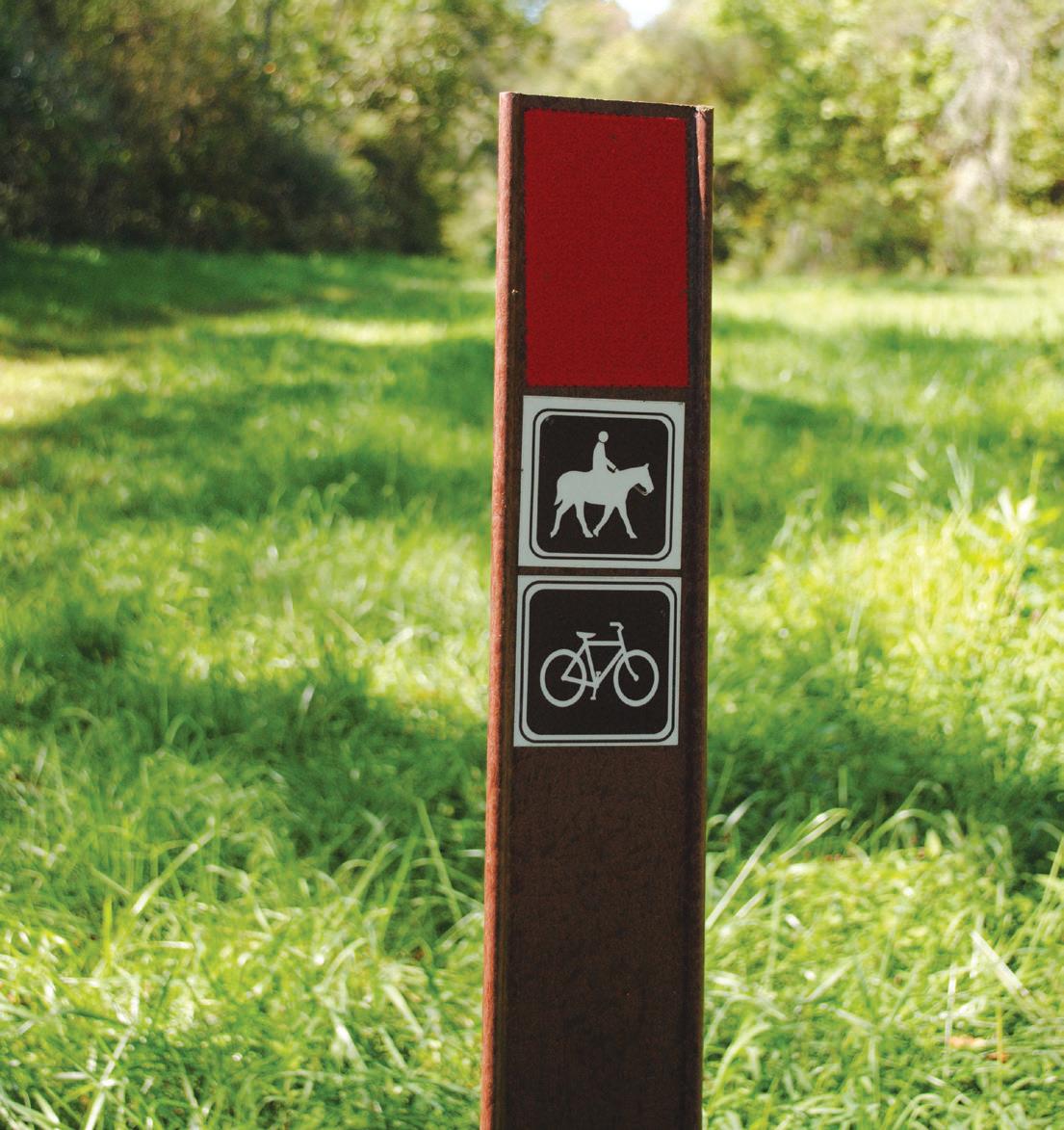






















TUESDAY: MEATLOAF OR PORK CHOP DINNER
WEDNESDAY:
THURSDAY:





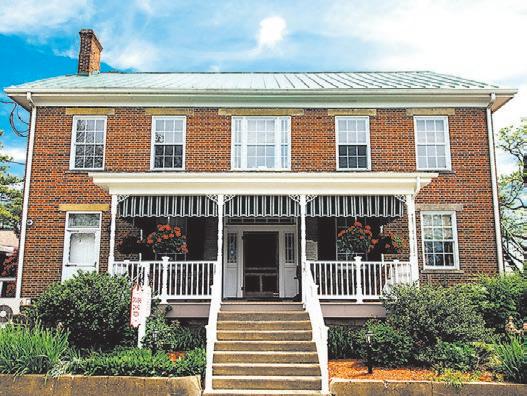
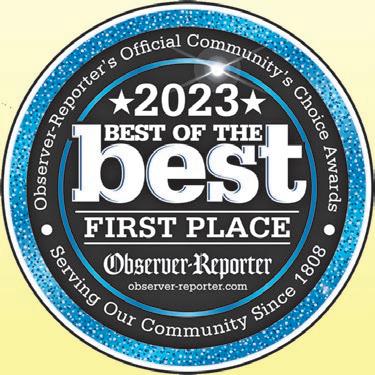




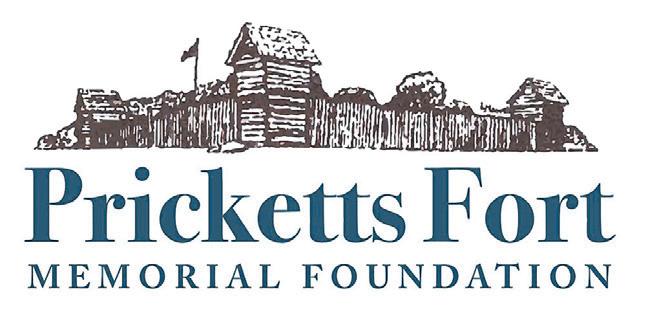



how do i...
how do i get my business at the top of search results?
how do i build a website for my business?
how do i reach new customers on social media?



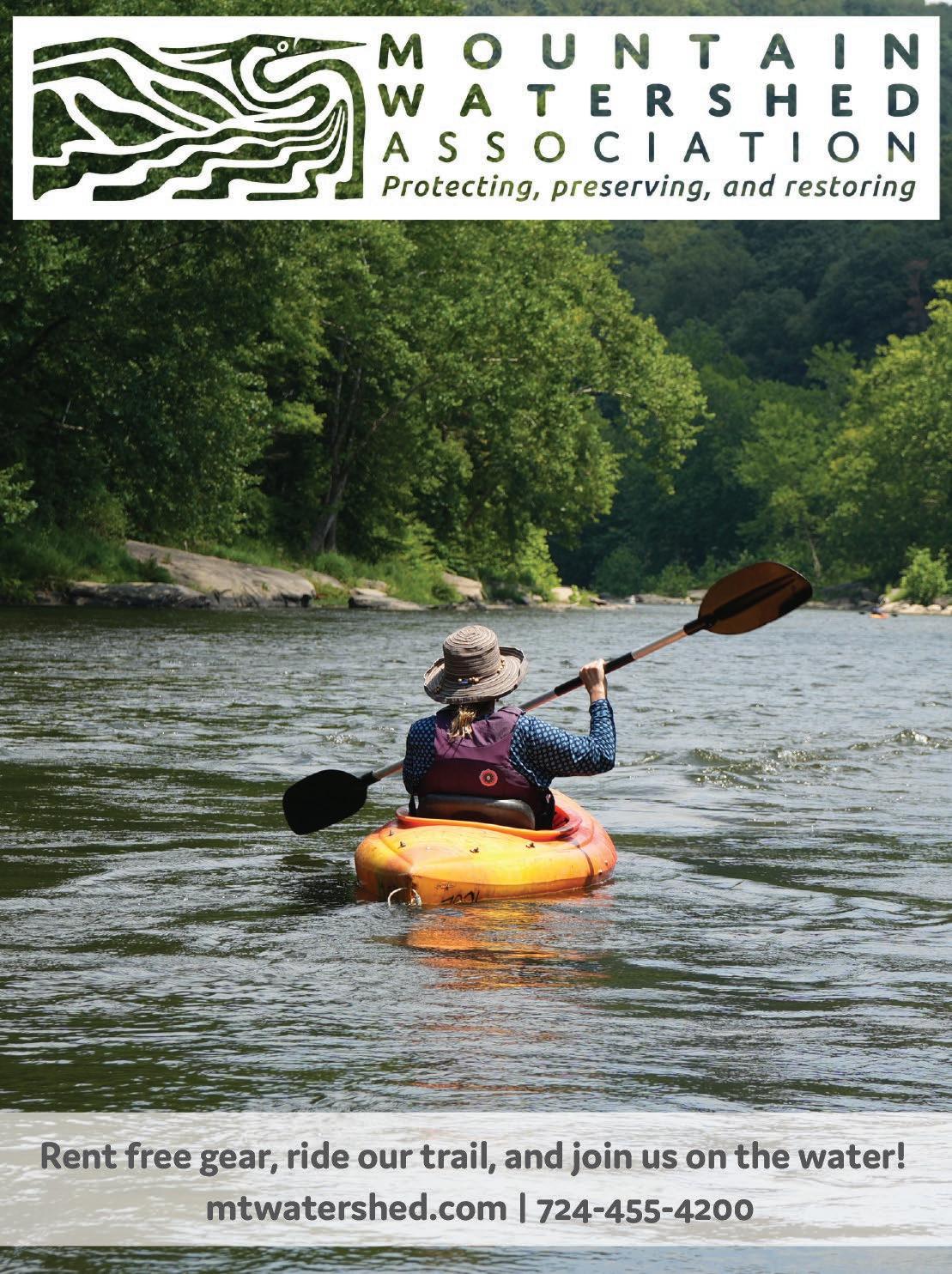
October 25 - 27



Enjoy the excitement of Notre Dame Football and the pag eantr y of the Midshipmen. Motor coach to Meadowlands, NJ and two night stay at the Hampton Inn. Game ticket to Notre Dame vs. Navy at MetLife Stadium. $699 per per son (double)
November 30 - December 1
Motor coach to Cincinnati and over night stay at Dr ur y’s in Mason, Ohio. Breakfast at the hotel and ticket to Steelers at Beng als with motor coach home after the g ame $599 per per son (double)


December 3
Motor coach to PPG Paints Arena and see the Penguins take on the Florida Panthers $109 per per son


Upcoming Events from Oct. 1 to Dec. 31
All event information was gathered from local tourism websites and was accurate at the time of publication. Event details are subject to change. Please call ahead or visit the websites provided for more.
Second Tuesday
Museum Open House
Free
6-8 p.m.
Greensburg Volunteer Fire Department Museum, 416 S. Main St., Rear, Greensburg gbgfire.com/museum
Wednesdays through October
Peters Township Farmers’ Market
4-7 p.m.
905 E. McMurray Road, Venetia
Waynesburg Farmers Market
10 a.m. to 1 p.m.
145 W. High St., Waynesburg
Thursdays
Bingo
6:30-9:30 p.m.
Waynesburg VFW Post 4793, 445 E. Lincoln St., Waynesburg facebook.com/groups/WBGVFWPOST4793
Second Thursday
Irwin Shop Crawl
4-9 p.m.
Thursdays through October
Main Street Farmers Market
3-6 p.m.
139 S. Main St., Washington
Fridays and Saturdays through October
West Alexander Scare Fair
$5-18
Doors open at 7 p.m. West Alexander Fairgrounds wascarefair.com
Saturdays through November
Cooking Demonstrations with Kate in the Kitchen Cabin Free
Bradford House Museum, 175 S. Main St., Washington bradfordhouse.org
Saturdays and Sundays through November
Foundry and Machine Shop Tours
$10
W.A. Young & Sons Foundry and Machine Shop, 114 Water St., Rices Landing riversofsteel.com/experiences/ tours/machine-shop-tour
Sundays through Oct. 20
Old Salem Farmers Market
10 a.m. to 2 p.m.
Greensburg Garden & Civic Center, 951 Old Salem Road, Greensburg thepalacetheatre.org/ggcc/farmers-market
Oct. 1 through Oct. 13
“Little Women”
$15-25
Little Lake Theatre Company, 500 Lakeside Drive, Canonsburg littlelake.org
Oct. 3
Pittsburgh Chamber Brass: Bach to Blues
$20-25
7-8:30 p.m.
The Westmoreland Museum of American Art, 221 N. Main St., Greensburg westmorelandsymphony.org/ event/pittsburgh-chamber-brassbach-to-blues
Spine-tingling Storytime: A Reading of Poe
$15
7-9:30 p.m.
OmBody Massage and Wellness, 90 W. Main St., 3rd Floor, Ste 300, Uniontown ombodymassageandwellness.com

Oct. 4
Springs Folk Festival
$4-7
9 a.m. to 5 p.m.
1711 Springs Road, Springs springspa.org
Adrenalize: The Ultimate Def Leppard Experience
$35
8 p.m.
The Lamp Theatre, 222 Main St. Irwin lamptheatre.org/adrenalize-thedef-leppard-tribute
Oct. 4-5
Bigfoot Event Free
Jefferson Volunteer Fire Company, 1483 Jefferson Road, Jefferson
Oct. 4-5
Confluence Pumpkinfest Confluence Town Park confluencepumpkinfest.com
Oct. 5
Wicked Witches Gala Free
4-8 p.m.
Downtown Greensburg hopgreensburgpa.com

Oct. 5-6
Hickory Apple Festival
106 Main St., Hickory hickoryapplefest.com
Delmont Apple ‘n Arts Festival
$7 parking donation Shield’s Farm, Delmont delmontapplenarts.com
Braddock’s Flea Market Free
8 a.m. to 4 p.m.
Braddock’s Restaurant & Tavern, 3261 National Road, Farmington braddocksinn.com/events
Harvest Festival
Admission by donation
10 a.m. to 5 p.m.
Greene County Historical Museum, 918 Rolling Meadows Road, Waynesburg greenecountyhistory.org
Oct. 6-5, 12-13
Bedford Fall Foliage Festival
Downtown Bedford, 124 South Juliana St., Bedford
Oct. 11
Broken Arrow: A Tribute to Neil Young
$35
8-10:30 p.m.
The Lamp Theatre, 222 Main St., Irwin lamptheatre.org/broken-arrow
Oct. 11-13
Houston Pumpkin Festival
124 W. Pike St., Houston houstonpumpkinfestival.net
Fort Ligonier Days
9 a.m. to 6 p.m.
Downtown Ligonier fortligonierdays.com
Oct. 12
Market in the Park
9 a.m. to 1 p.m.
Washington Park, 283 Dunn Ave., Washington facebook.com/thewashingtonpark
Cats, Bats, Books and Besoms
10 a.m. to 3 p.m.
RGB Coffee, 30 N. Washington St., Waynesburg
Hard Day’s Night Beatles Tribute
$31
8-10:30 p.m.
The Lamp Theatre, 222 Main St., Irwin lamptheatre.org
Oct. 12-13
“High School Musical On Stage!”
$15-20
The State Theatre, 27 E. Main St., Uniontown mstcuniontown.org/project/highschoolmusical
Oct. 13
Antiques and Collectibles Sales
$5 per car
Westmoreland Historical Society, 809 Forbes Trail Road, Greensburg westmorelandhistory.org
Oct. 16
History Speaks Series
Bushy Run Battlefield, 1253 Bushy Run Road, Jeannette bushyrunbattlefield.com/history-speaks
Oct. 18-19
Waynesburg University Homecoming
waynesburg.edu/alumni-and-giving/homecoming-2024-schedule
Oct. 18-20
Pennsylvania Arts and Crafts Christmas Festival
Washington County Fairgrounds familyfestivals.com/pa-christmas-festival
“Evil Dead: The Musical” 8-10 p.m.
Greensburg Civic Theatre, 951 Old Salem Road, Greensburg gctheatre.org
Oct. 19
Witchfest
Noon to 8 p.m.
Monongahela Aquatorium, 200 Railroad Street, Monongahela monaquatorium.com/events
Christians in the Paranormal Free
Noon to 5 p.m.
EQT REC Center, 400 EverGreene Drive, Waynesburg
Nottingham Township Annual Halloween Trail Free
1-3 p.m.
Nottingham Township Park, 909 Sugar Run Road, Eighty Four nottinghamtwp.com
Boos, Brews and Books Free
7-9 p.m.
616 E. McMurray Road, McMurray events.ptlibrary.org/event/boosbrews-books-19255
Music to Die For 7:30 p.m.
Washington Symphony Orchestra, 385 E. Wheeling St., Washington
Oct. 20
Sheriff’s Fun Run Zombie 5K 10 a.m.
Mingo Creek County Park sheriffsfunrunzombie5k.itsyourrace.com
Scratch Block Aluminum Casting 3 p.m.
W.A. Young & Sons Foundry and Machine Shop, 114 Water St., Rices Landing riversofsteel.com/events
Music to Die For 7:30 p.m.
Washington Symphony Orchestra, 385 E. Wheeling St., Washington
Oct. 24 through Nov. 10
“A Fox on the Fairway” $15-25
Little Lake Theatre Company, 500 Lakeside Drive, Canonsburg littlelake.org
Oct. 25 Ghost Walk Free
9 a.m. to 9 p.m. Main Street, Irwin downtownirwin.com
Oct. 25-27
Haunted Halloween Tales 6-9 p.m.
Compass Inn Museum, 1382 Route 30 East, Laughlintown compassinn.org/eventcalendar
Oct. 26
Jack-O-Lantern Jog and Skeleton Stroll
9 a.m.
314 Elm St. Extension, Canonsburg
Shades of Death 10-Miler
Shades of Death Road, Avella shadesofdeathrun.com
Cooking Demonstrations
10 a.m. to 4 p.m. Bradford House Museum, 175 St. Main St., Washington
Pumpkin and Spice Festival
11 a.m. to 2 p.m. Ligonier ligonier.com
Fall Family Day
$6-8
11 a.m. to 4 p.m.
Westmoreland Historical Society, 809 Forbes Trail Road, Greensburg westmorelandhistory.org/events/ fall-family-day-3/
Children’s Halloween Costume Parade Free 1-3 p.m.
Downtown Irwin downtownirwin.com
American Mosaic Opening Night
$20+
7:30 p.m.
The Palace Theatre, 21 W. Otterman, Greensburg westmorelandsymphony.org
Nov. 1-3
Christmas in the Village Free admission and parking
10 a.m. to 5 p.m.
12 Fire Road. Burgettstown christmasinthevillagepa.com
Nov. 2
Holiday Market Free
Noon to 4 p.m.
Ligonier Country Market, Corner of West Main Street and Springer Road, Ligonier ligoniercountrymarket.com
Bonfire Night: A Historical Fall Celebration
4-8 p.m.
Compass Inn Museum, 1382 Route 30 East, Laughlintown compassinn.org/eventcalendar
Jim Donovan & Sun King Warriors and Tres Lads
$25
8-11 p.m.
The Lamp Theatre, 222 Main St., Irwin lamptheatre.org/jim-donovan-sunking-warriors
Nov. 2-3
Fall Antiques and Collectibles Sale
$5
Washington County Fairgrounds & Expo Center, 2151 N. Main St., Washington duncan-miller.org
Nov. 7
Whiskey Rebellion Dinner
$150
6-9:30 p.m.
Hilton Garden Inn, 1000 Corporate Drive, Canonsburg bradfordhouse.org
Nov. 7-10
“Sister Act”
$16-20
7:30-10 p.m.
Nineteen North, 19 N. Main St., Washington wct-tickets.ticketleap.com/sister-act
Nov. 9
Christmas Craft Show
10 a.m. to 4 p.m.
Greene Academy of Art facebook.com/greeneacademyofart
Fall Vendor Show
$2
8:30 a.m. to 2 p.m.
EQT REC Center, 400 EverGreene Drive, Waynesburg
Nov. 16
Fall Craft and Vendor Show
8 a.m. to 3 p.m.
Greene County Fairgrounds, 107 Fairgrounds Road, Waynesburg facebook.com/AuxilaryVFW4793
Nov. 16-17
Scenery Hull Christmas Market and Light Up Night Free
2183 E. National Pike, Scenery Hill visitsceneryhillpa.com/event/ scenery-hill-christmas-art-marketlight-up-night-2/
Nov. 23
Waynesburg Toy and Comic Expo
10 a.m.
EQT REC Center 400 Evergreene Drive, Waynesburg
Turkey Trot
$15-25
9 a.m.
Eva K. Bowlby Public Library, 311 N. West St., Waynesburg runsignup.com/Race/PA/Waynesburg/EvaKBowlbyLibrary5KTurkeyTrot
Nov. 27
Light Up Night in Olde McDonald Free
6 p.m.
McDonald Trai Station and History Center, 161 S. McDonald St. mcdonaldtrailstation.com
Nov. 29
Light Up Ligonier
6:30-8 p.m.
120 E. Main St., Ligonier ligonier.com
Nov. 29 through Dec. 8
“The Best Christmas Pageant Ever”
$15-25
Little Lake Theatre Company, 500 Lakeside Drive, Canonsburg littlelake.org
Nov. 30
Cooking Demonstrations
10 a.m. to 4 p.m.
Bradford House Museum, 175 St. Main St., Washington bradfordhouse.org
Waynesburg Christmas Tree
Lighting
Downtown Waynesburg waynesburgfire.com/waynesburg-christmas
Dec. 1
Holiday Open House and Vendor Show
1-4 p.m.
151 Thistlethwaite Lane Jefferson facebook.com/thistlethwaite. vineyards
Dec. 4
Holiday Tea
$50
Bradford House Museum, 175 St.
Main St., Washington bradfordhouse.org
Dec. 6
Christmas Cookie Tour Free
5 p.m.
Main Street, Irwin downtownirwin.com
Dec. 6-7
All-Clad Factory Sale
Washington County Fairgrounds all-clad.com
Canonsburg’s Old Fashioned Christmas
Downtown Canonsburg canonsburgsoldfashionedchristmas.com
Roald Dahl’s “Willy Wonka Jr.” Greensburg Civic Theatre, 951 Old Salem Road, Greensburg gctheatre.org
Dec. 6-8
Christmas in the Mountains Donegal christmasinthemountains.info
Dec. 7
Holiday Tea
$50
Bradford House Museum, 175 St. Main St., Washington bradfordhouse.org
Waynesburg Christmas Parade 2-4 p.m.
Greene County Courthouse, 10 E. High St., Waynesburg greenechamber.org/christmas-parade
Carmichaels Christmas Parade 4:45-6:30 p.m.
103 N. Market St., Carmichaels
Dec. 7-8
Holiday Makers Market Free
10 a.m. to 3 p.m.
West Overton Village and Museum, 109 West Overton Road, Scottdale westovertonvillage.org
Christmas Open House
Noon to 5 p.m.
Greene County Historical Museum, 918 Rolling Meadows Road, Waynesburg greenecountyhistory.org
Dec. 7-10
Ligonier Valley Historical Society’s Festival of Lights
9 a.m. to 5 p.m.
201 E. Main St., Ligonier compassinn.org
Dec. 8
Holiday Craft Blast
10 a.m. to 4 p.m.
Greene County Fairgrounds, 107 Fairgrounds Road, Waynesburg natgreene.org
Dec. 12-14
Deck the Barns: Lighted Christmas Drive Thru $20 per car 5-11 p.m.
Washington County Fairgrounds washingtonfair.org
Dec. 12-21
Jacob Marley’s “Christmas Carol”
$15-25
Little Lake Theatre Company, 500 Lakeside Drive, Canonsburg littlelake.org
Dec. 14
“The Nutcracker”
$20+
The Palace Theatre, 21 W. Otterman, Greensburg westmorelandsymphony.org
Dec. 14-15, 21-22
Christmas by Candlelight 4-8 p.m.
West Overton Village and Museum, 109 West Overton Road, Scottdale westovertonvillage.org
Dec. 19
Darr Mine: Pennsylvania’s Worst Mine Disaster 6-8 p.m.
Rostraver Township Historical Society, 800 Fellsburg Road, Rostraver Township
Dec. 21
Home for the Holidays
$20+
The Palace Theatre, 21 W. Otterman, Greensburg westmorelandsymphony.org
Dec. 21-22

Ho Ho Ho with the Washington Symphony Orchestra
$17-22
Washington Symphony Orchestra, 285 E. Wheeling St., Washington
Photo courtesy of Ben Moyer
This view, looking northward into Pennsylvania, shows the stone marker standing in the exact spot where Mason and Dixon fixed their last and westernmost location along the surveyed line on Oct. 11, 1767. The threat posed by hostile Indians forced the surveyors to abandon the project there. Another team completed the line 23 miles farther west in 1784.

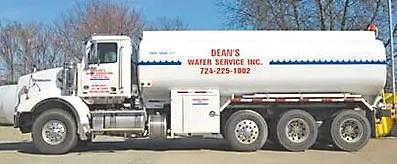

And we still have a great selection of Certified Pre-Owned Vehicles to choose from OVER 80 CURRENTLY IN STOCK

7 Year Recipient of the Presidents Award


Ford of Uniontown is a Proud Participant in the “Co Stars” Program
